
When and how did you first become interested in science?
My initial interest was actually in medicine, but I realized that medicine doesn’t always provide in-depth molecular reasons for why disease occurs and why certain treatments don’t work for everyone. I turned to science during my undergraduate career because I wanted to gain a better understanding of disease at a molecular level.
Was there someone along the way who nurtured your interest in science?
I’ve had many mentors — faculty, other trainees, and so on — throughout my education who have helped direct my interests and guided me through the process of becoming a scientist.
Why did you choose Gerstner Sloan Kettering for graduate study?
I chose GSK to conduct my graduate study because I was interested in the research being conducted here. I really like that Memorial Sloan Kettering has a clinically oriented focus when it comes to many of its research labs — that aspect is very unique and doesn’t happen at most other institutions.
What could the scientific community do better to support female scientists?
I think one of the biggest things that the scientific community could do is help more women get into faculty positions and high-power roles at academic institutions.
What do you always try to find time for outside of the lab?
I try to make time for my friends and family. Most of them live outside the state, so whenever I can take a weekend off, I like to travel out to see them.



